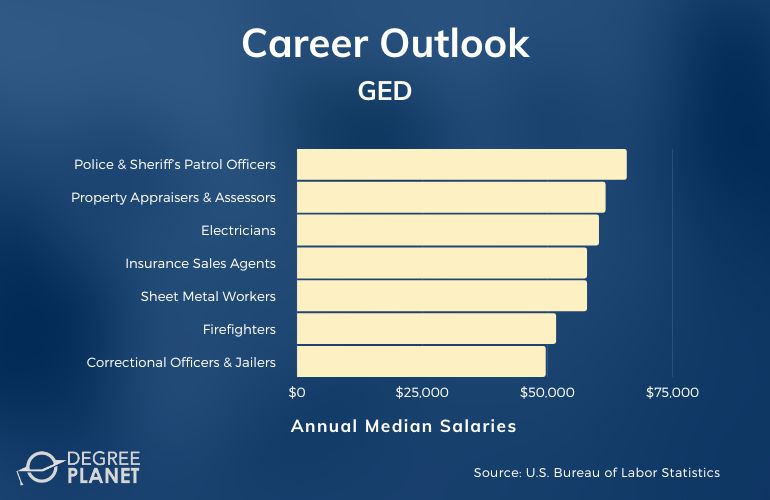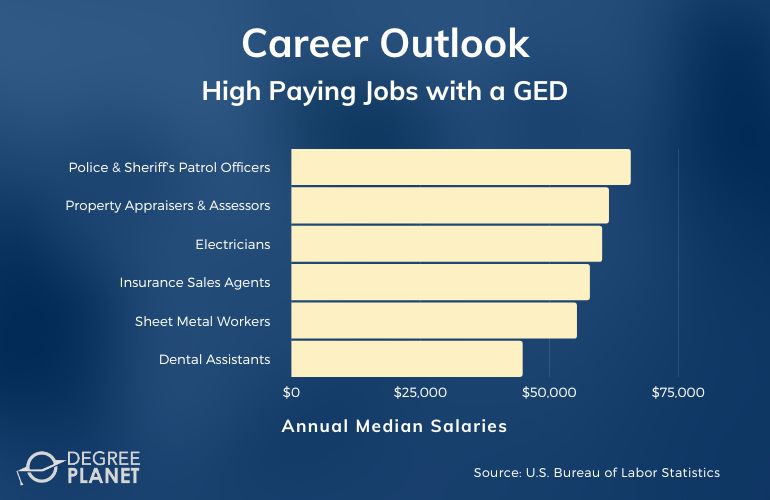What can you do with a GED? This is a valid and commonly asked question for students who haven’t completed high school.

Fortunately, a General Education Development (GED) test certifies that you’ve completed the equivalent of a high school-level education. This level of education can be valuable in the workforce and open the doors to various careers.
Editorial Listing ShortCode:
If you’re contemplating earning your GED, you can read on to learn more and see how it might benefit you.
What Can You Do with a GED?

Potential careers with a GED vary depending on your individual goals. For instance, many students earn their GEDs and immediately enter the workforce. Other students use it to continue their education so that they may qualify for more job opportunities in the future.
Holding a GED demonstrates that you’re equipped with a base-level knowledge that allows you to perform key functions across organizations. As such, it’s very common for GED holders to be found in careers like hospitality, office administration, security, and more.
Editorial Listing ShortCode:
To further specify, some people pursue jobs as housekeepers, secretaries, or security guards. You may also choose to attend universities or colleges that accept GED credentials. Essentially, a GED allows you to pursue many of the career and academic options that high school graduates can. Once you define your goals, you can get to work creating the future you want.
5 Things You Can Do with a GED
Available careers with a GED can be very diverse, as a high school education is a common entry-level requirement for a variety of occupations. Here are some potential jobs that can be pursued with a GED.
1. Office Support Administration

GED holders may find themselves qualified to begin a career in office support administration. Businesses and organizations across the world employ administration professionals, so you may have a variety of opportunities to enter the field.
Many GED holders can be found working as receptionists, bill collectors, office clerks, and more. Each role generally requires you to interact with customers, file paperwork, manage payroll, enter data, and more.
2. The Arts

It’s also common for people with a GED to find themselves thriving in the arts, especially since many artists aren’t required to have a college degree to be successful. Careers in the arts are plentiful, allowing people to be anything from a painter to a floral designer.
Day-to-day tasks will vary depending on the specific career of your choice. That said, you can imagine that a career as an artist will likely involve much of the work you may already do as a burgeoning artist.
3. Grounds or Building Maintenance

Careers in grounds or building maintenance are among the most popular jobs you can get with a GED. Those who enter this field may take on jobs as maintenance, janitorial, or pest control professionals.
As a professional in this field, you could work to maintain the safety of buildings and homes while also keeping them sanitary for their inhabitants.
4. Sales

If you’re more interested in working in a field that values your people skills, then you might consider a career in sales. If you were to pursue sales, then you might find yourself working as an insurance sales agent or a retail sales worker.
The day-to-day tasks of these jobs vary, but generally speaking, you can expect to communicate with customers to help them acquire the products or services they need.
5. Protective Services

Careers in protective services are among the many promising careers you could consider pursuing after acquiring your GED. So, what do these careers look like?
Editorial Listing ShortCode:
Many people find work as security guards, private detectives, or correctional officers. These occupations allow you to protect others by being armed and preventing potential criminal activity.
GED Careers & Salaries

Careers with a GED can be varied and plentiful. Having a credential that demonstrates you have the equivalent of a high school education can help you qualify for more career opportunities.
According to the Bureau of Labor Statistics, here is just a sample of potential career paths that are often available to workers who hold a high school diploma or equivalent.
| Careers | Annual Median Salaries |
| Police and Sheriff’s Patrol Officers | $65,790 |
| Property Appraisers and Assessors | $61,560 |
| Electricians | $60,240 |
| Insurance Sales Agents | $57,860 |
| Sheet Metal Workers | $55,350 |
| Firefighters | $51,680 |
| Correctional Officers and Jailers | $49,610 |
| Dental Assistants | $44,820 |
| Office and Administrative Support Occupations | $40,910 |
| Security Guards | $34,750 |
It can be helpful to think about your current skills and interests in order to get an idea of which careers you’d like to enter. Of course, many factors influence the hiring process, so no career is guaranteed. That said, earning a GED can grow your professional qualifications.
What Is a GED?

A General Educational Development (GED) test is a series of tests that you may take in place of earning a high school diploma. Essentially, you’ll be tested on a series of subjects that a person with a high school-level education should know upon graduation.
Earning a GED is beneficial for students who didn’t complete high school and are looking to either continue their education or begin working. With this high school equivalency credential, you can both be confident in your education and your future job prospects.
Can You Go to College with a GED?

One major benefit of attaining your GED is that it often qualifies you to go on to college and obtain advanced academic degrees.
There may be a few caveats that you should be aware of, though. Sometimes students are required to demonstrate a college-ready score on the GED test, not just a passing score. That said, there are many colleges that accept GED, including prestigious universities like Harvard. As you can see, a GED may be the first step toward continuing your academic journey.
What Jobs Can You Get with a GED Diploma?

There are many different jobs you may qualify for with a GED alone. Some GED holders pursue careers as:
- Secretaries
- Office clerks
- Grounds maintenance workers
- Florists
- Correctional officers
- Boilermakers
- Construction equipment operators
- Police officers
The above careers only represent a few of the ones that may be available to you after earning your GED. Many jobs require additional on-the-job training. Ultimately, the job you pursue will depend on your own unique goals and ambitions. A GED can also act as a stepping stone toward higher education.
How Long Does It Take to Get a GED?

The time it takes to earn your GED can depend on your individual circumstances. In general, many students earn their GED in 2 months to 3 months, provided they study for about an hour or two each day.
Editorial Listing ShortCode:
Studying for the GED can help determine the amount of time it takes you to pass the GED test. Are you motivated? Are you taking prep classes in person or online? How much high school education do you already have? Factors like these will influence the time it’ll take you to earn your high school equivalency credential.
What High Paying Jobs with a GED Can I Get?

There are many high-paying jobs that only require GED for entry. According to data from the Bureau of Labor Statistics, here are the median salaries of some of the high-paying jobs you may qualify for after earning a GED:
- Police and sheriff’s patrol officers — $65,790
- Property appraisers and assessors — $61,560
- Electricians — $60,240
- Insurance sales agents — $57,860
- Sheet metal workers — $55,350
- Dental assistants — $44,820
These career paths tend to require additional on-the-job training. It’s important to remember that no credential can guarantee a specific job or salary, but a GED can go a long way in helping you be eligible to apply.
What’s the Difference Between a GED vs. Diploma?
The General Education Development test is considered equivalent in academic standing to a high school diploma. That said, there are many differences that you may want to be aware of when it comes to a GED vs. high school diploma.
| GED | High School Diploma |
|
|
Understanding these differences may help you get an idea of what to expect going forward.
What’s the Difference Between a HiSET vs. GED?
Both a GED and High School Equivalency Test (HiSET) offer people the option to earn a credential that’s equivalent to a high school diploma. That said, here are some of the differences between a HiSET vs. GED.
| High School Equivalency Test (HiSET) | General Educational Development (GED) Test |
|
|
Both of these exams can help set you up for success, so it’s ultimately up to you to decide which one best suits your needs. It’s also necessary to check your state’s requirements for these two options.
Is a GED Worth It?

Yes, a GED is worth it for many students. Earning a high school equivalency credential offers the opportunity to increase your knowledge, help you qualify for college applications, and potentially elevate your career prospects.
Editorial Listing ShortCode:
According to the Bureau of Labor Statistics, the unemployment rate for those with a high school education is 6.2%. This is lower than the 8.3% unemployment rate for those who have less than a high school diploma or GED equivalent. With a GED, you have the chance to pursue higher education or enter the workforce directly.
Getting Your GED

Earning a GED is often the first choice for students who didn’t finish high school and are looking to complete a high school equivalency credential.
If you’re wanting to go on to college or to enter the workforce with necessary qualifications, then getting a GED is a strategic step. A GED allows you to expedite the process of receiving the equivalent of a high school diploma, which in turn increases your earning potential and career opportunities.
If you’re interested, you can start looking into GED study options and even accredited colleges with GED programs today!

